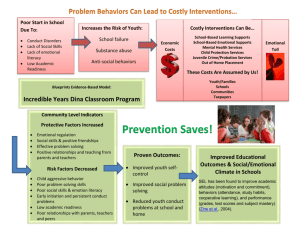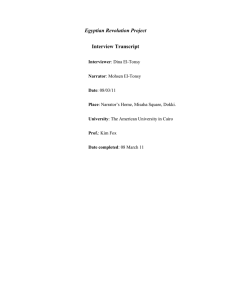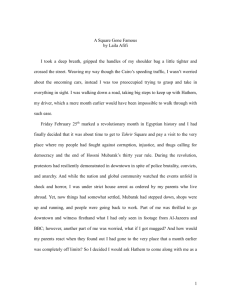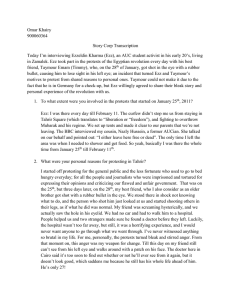The Organization, Security and Social Interaction in Tahrir during
advertisement
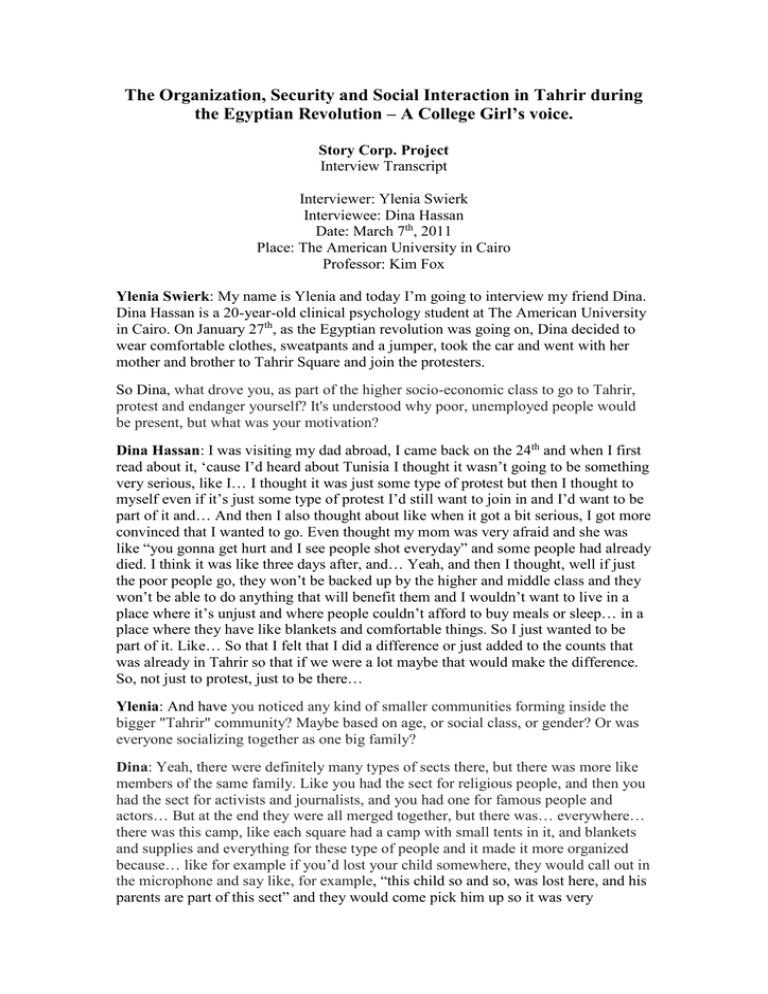
The Organization, Security and Social Interaction in Tahrir during the Egyptian Revolution – A College Girl’s voice. Story Corp. Project Interview Transcript Interviewer: Ylenia Swierk Interviewee: Dina Hassan Date: March 7th, 2011 Place: The American University in Cairo Professor: Kim Fox Ylenia Swierk: My name is Ylenia and today I’m going to interview my friend Dina. Dina Hassan is a 20-year-old clinical psychology student at The American University in Cairo. On January 27th, as the Egyptian revolution was going on, Dina decided to wear comfortable clothes, sweatpants and a jumper, took the car and went with her mother and brother to Tahrir Square and join the protesters. So Dina, what drove you, as part of the higher socio-economic class to go to Tahrir, protest and endanger yourself? It's understood why poor, unemployed people would be present, but what was your motivation? Dina Hassan: I was visiting my dad abroad, I came back on the 24th and when I first read about it, ‘cause I’d heard about Tunisia I thought it wasn’t going to be something very serious, like I… I thought it was just some type of protest but then I thought to myself even if it’s just some type of protest I’d still want to join in and I’d want to be part of it and… And then I also thought about like when it got a bit serious, I got more convinced that I wanted to go. Even thought my mom was very afraid and she was like “you gonna get hurt and I see people shot everyday” and some people had already died. I think it was like three days after, and… Yeah, and then I thought, well if just the poor people go, they won’t be backed up by the higher and middle class and they won’t be able to do anything that will benefit them and I wouldn’t want to live in a place where it’s unjust and where people couldn’t afford to buy meals or sleep… in a place where they have like blankets and comfortable things. So I just wanted to be part of it. Like… So that I felt that I did a difference or just added to the counts that was already in Tahrir so that if we were a lot maybe that would make the difference. So, not just to protest, just to be there… Ylenia: And have you noticed any kind of smaller communities forming inside the bigger "Tahrir" community? Maybe based on age, or social class, or gender? Or was everyone socializing together as one big family? Dina: Yeah, there were definitely many types of sects there, but there was more like members of the same family. Like you had the sect for religious people, and then you had the sect for activists and journalists, and you had one for famous people and actors… But at the end they were all merged together, but there was… everywhere… there was this camp, like each square had a camp with small tents in it, and blankets and supplies and everything for these type of people and it made it more organized because… like for example if you’d lost your child somewhere, they would call out in the microphone and say like, for example, “this child so and so, was lost here, and his parents are part of this sect” and they would come pick him up so it was very organized, surprisingly. When I went in, they checked the ID’s and our bags, and it was very organized… I was very shocked. And then you had like people offering you tea, and food, and blankets, and distributing… And then you had the people in the back, there was this place where they did surgeries and like first aid, and… and they had this storage for all the donations of… as means of… like medication or blankets, so that at night they would distribute them to the people, so that they could sleep. Ylenia: And, I heard about some activities that were going on, like people singing and protesting all together and doing like funny signs and everything, so… Was it organized by someone or it just like… people were doing it on their own? Dina: No, it wasn’t organized at all, but… it was more like, for example, I am a normal person and I am not… I’m not a leader on anything, I would just start by chanting something really loud and people would follow me. Then you had people who did songs, and who did rhymes, and who did caricatures, and paintings, and stuff that was making fun of Mubarak… And then you had people painting on the floor, and like drawing with chalk, and then… Yeah, it was… I hate to compare it to this, because it was something more serious, but it was more like a carnival and camp… Like at night, we’d start a fire and people would start singing songs about Mubarak and we all laugh together, and we’d all listen to the news together, and it was like one big family… And it wasn’t organized but at the same time it’s not chaotic. It was like, very together… Ylenia: And you were talking about “night”, so you slept there? You stayed there till late, or…? Dina: Yeah, I… There was this one day when I slept… I can’t remember which day, but it was the day of the two speeches… One speech that was very devastating, and the speech after when he said that he would abdicate. So, I went with my boss, and this time I… I work for this anti-drug campaign, and they’re making a movie and like a hospital… so when I went with him, we went to the… to the section where there were actors and famous people, and… And you could see a lot of activists there too, they were chanting and they were protesting and everything… And I went to… He was donating medications… So I went to see the part where they had like hospitals and… Surprisingly, they had like surgery… they had a surgery section, and first aid… And people were going there and getting like, their faces sewn together, and bullets taken out, and everything, and… Yeah, and then at night I went to the parliament, the ‘maglesh el shaab’ place and… I’d say the people there were higher class, but not because it’s divided, more because some of these people were too scared to join in, in Tahrir because it was so crowded that day, because he was gonna give a speech and people were expecting it to be the last speech, and… And then they had these tents made of plastic wrap and they called them the ‘villas’… But of course they were lower class people, but like… it was somewhat more of the higher socio-economical class… And then, there were people protesting at night, then we had these campfires and… and then there was this speech where everybody was like… I saw like maybe three grown men collapse to the floor, and they had a nervous breakdown and you had to spray them with water, so they would like feel better and they were crying… And everybody was like… I saw like every five people listening to one phone, for… like to hear the speech, and… Yeah, it was very held together, and then… I went with my mom and we slept at this place called “Locandat El-Isamaileya,” which is basically the eighth floor of this building in the middle of Tahrir and we paid like 50 pounds and we were five people in one room, it was very amusing… it was quite the experience. There were like authors, and activists and journalists there, and people from abroad who were like recording… And in the morning I was interviewed by this man who was writing a book about the Tahrir Square and everything… and then we heard the speech… And everybody was crying, and bla bla bla, but… I have this remark that people were so held together… People were so held together that it made me think about the psychological aspect and how Mubarak could… I couldn’t believe how oppressive he was to the extent where he got to people’s heads, and made them fight together just for the sake of fighting so that they wouldn’t think about politics… Like for example, I was wearing tight pants and so were a lot of other girls, and like you wouldn’t see anybody harassing us, not even looking at us… We were all like brother and sister… And there were people from very, very low socio-economical statuses and they could’ve harassed me easily, or anybody else. Like you could see people with very revealing clothes, not very, but like… according Egyptian like… the way they think, it would be very revealing… and nobody like laid a finger on them, nobody touched them… They were religious people and they were still talking to these girls… it wasn’t like “oh my God, this is like a Sunni guy” he is not gonna look at you or… There were ladies in burkas and they talked to these women normally, they didn’t like lecture them, and at the same time these women weren’t like “oh my God, these are terrorists, they have beards and they wear burkas…” It’s not what it was like… It was more like we were all holding together, both religions and statuses, and… Like, when we went to pray, we were all praying in the streets, and like Christians would protect us, and when Christians were praying the Muslims would protect them when they were doing their mass on Friday… So it was very, like, held together and… And also like you could see a lot of poor people, and I… For example, I left my bag open in the street, and my wallet was outside and nobody laid a finger on it, so it was very, very safe… Ylenia: You didn’t hear about any instance of girls being harassed, or robberies, or anything… Even the days that they were saying that those thieves got out from jail and they were going around in Cairo and everyone was really scared and the guys were in the streets protecting their families… Did you feel any of this in Tahrir? Dina: Not in Tahrir, because usually the guys that escaped prison were more interested about like going to the other streets and robbing everything while everybody was in Tahrir not being aware… And also at the same time… No, we all acted as one hand, so I feel like Mubarak was keeping us hungry and building these problems for us, and building barriers between layers of social classes and maybe religions… So, like, he made us so occupied with these issues that we weren’t thinking about politics… But now that we were thinking about politics, all the other insignificant issues didn’t matter… So we were all acting as one hand… If there was somebody hit, everybody would go and protect that person and… Of course there were like shootings at night but that was more of… Like, it was the police’s fault, they would come and attack us, but like none of us were attacking each other… We were all one body… So, no, nothing really happened. Ylenia: And how… How did you feel these days or did it leave something inside you? As a psychology major did you notice some kind of interesting actions or have you had any feeling that, you know, you didn’t know you would have or something you understood from this situation, dangerous situation? Dina: The thing is I’ve changed drastically, and I think everybody that I’ve met changed… Like everybody has become more aware that Mubarak was building these barriers between us so… We were more like… friendlier together… People don’t throw their trash on the streets anymore; they are psychologically more serene because they don’t feel like there is something between us… I’m not envious of you and I don’t think they’re trash… But it also left this feeling that I did a difference just by being there and I want to be part of it… I was talking to my friends who weren’t really into it and I was like “when we win this, when Mubarak leaves, you won’t be allowed to say, ‘I was part of this.’ Even though this is your generation you won’t be allowed to say this because you didn’t participate… You didn’t even care.” And I’m glad that I did, and I regret that I didn’t go as often. In fact, if I could, I would have… I would have spent every single day there and… I’m so envious of the people that like died or like the people that go injured, because I feel like they’re the ones that did something… Even though I was just there and, okay I was part of it and I was part of the count… but I didn’t really do something, I didn’t… If I’d injured myself, for example, I would have this scar to keep it until I grow up and then like, “this was part of the revolution!” I feel like I made a difference… But now I feel like all I have is memories and a glove that they gave, like they were distributing gloves at night when I slept there… So this is like my, my favorite glove in the world and I wouldn’t change anything for it. This is something that reminds me of the revolution, so yeah… Ylenia: Okay, thank you Dina. Dina: You’re welcome.
